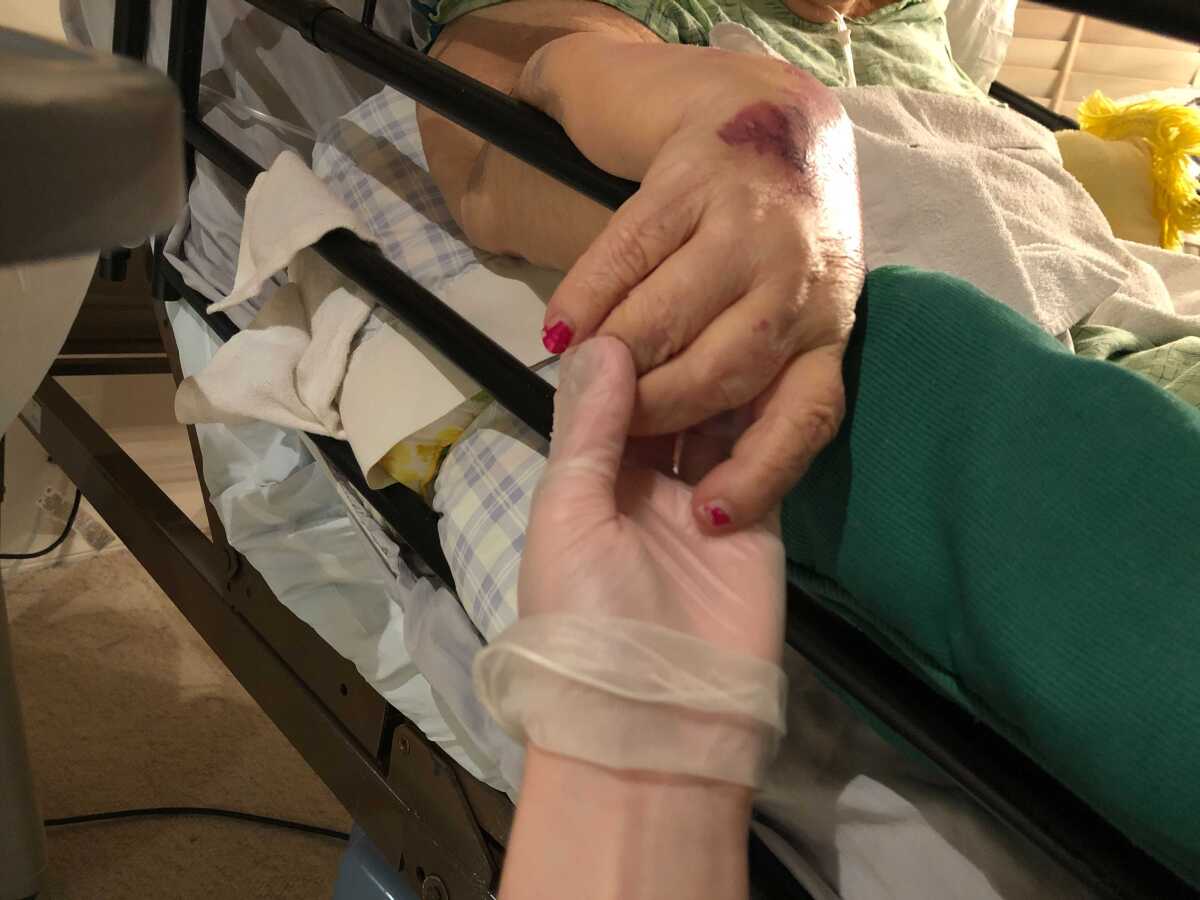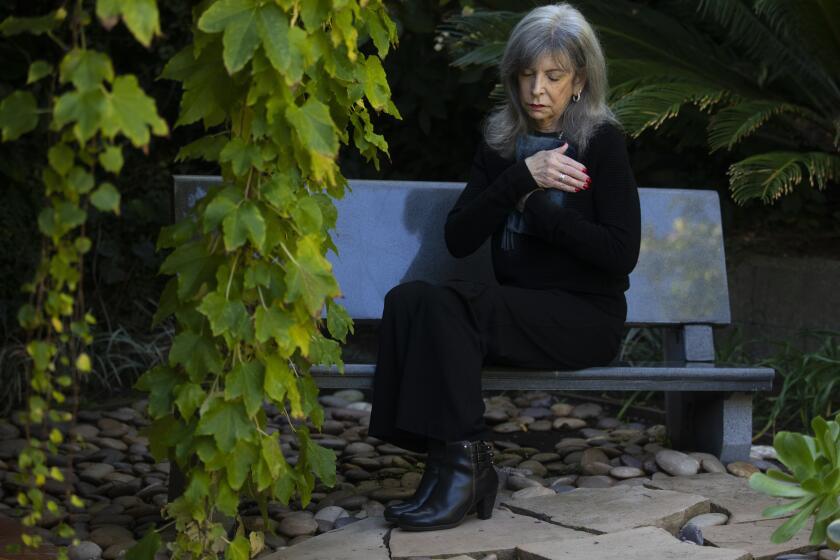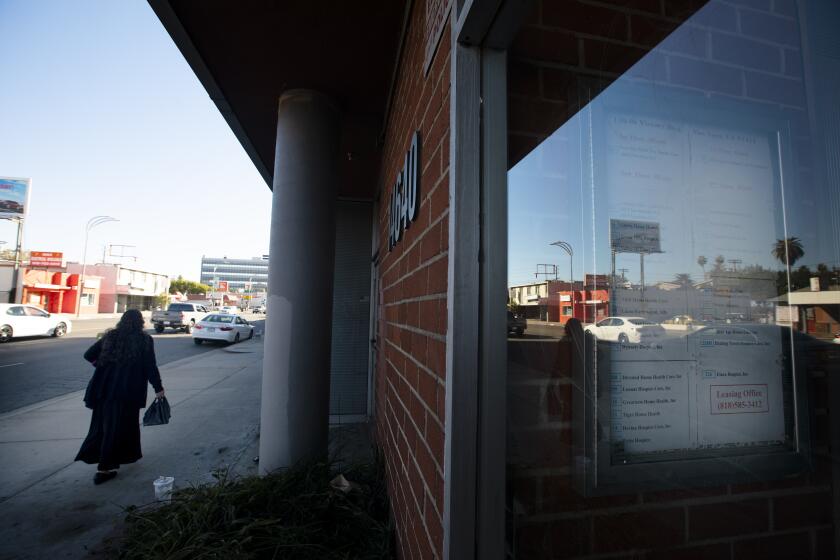I’ve said goodbye — twice — to loved ones in hospice this year. Tips from experts, and from me

- Share via
I never imagined I would again be writing about a loved one in hospice care in 2020. After losing my beloved grandpa in April — enduring the quiet pain of holding his hand one last time with my latex glove between us — his widow entered hospice care herself.
Trying to mourn my grandpa Frank Richelieu, a longtime Angeleno, during the ongoing COVID-19 pandemic has already been agonizing. We have yet to hold a memorial service. Getting our large Italian family together remains unwise as Southern California endures its worst stretch of the pandemic yet.
Now our strength and resilience are again being tested. My grandma Anita Richelieu transitioned to hospice care recently.
If you are also saying goodbye to a loved one while social distancing, I hope this advice — from hospice experts and from what I’ve learned — can bring you and your family some comfort.
These are times of lonely sorrow, but we can at least come together virtually. Comments are open below, and I welcome the opportunity to hear your stories and advice.
What you can do for your loved one
Just be present, however that may look or sound. “Presence is 90% of it,” said Coleen Dumenjich, licensed clinical social worker and member of the Providence TrinityCare Hospice team, who recommends sending handmade cards or expressing love over the phone.
“Even when the person is unresponsive, [phone calls] are very effective,” Dumenjich added. “Hearing is the last to go.”
Help empower your loved one. Dumenjich stressed the importance of giving your loved one choices to help him or her feel more in control of the situation. The choice can be as simple as offering tomato soup or chicken noodle.
Share old photos. You can send photos in the mail if your loved one is in a nursing facility or not available for an in-person visit. Elena Green, an Infinite Care Solutions caregiver working in L.A. County, recalls how grateful her clients have been to reflect on memories captured in photos with loved ones.
Include them in socially distant holiday plans. Consider a Zoom family dinner to help them feel connected, Dumenjich adds. She also recommends setting the table with a place setting and a lighted candle and letting them know that you felt their love there.
Write down or make a favorite recipe. Was your loved one a good cook or always talking about a favorite dish? Encourage him or her, if able, to recall the recipe of a special meal. Consider making it, or, if you aren’t able to visit, ask if caregivers might be willing to try.
“Recipes are a nice way to give and honor memories,” Dumenjich adds.
Give your best. “Give as much as you can from your heart to help them feel that they are important,” says Emma Ona, a full-time private caregiver based in L.A. County.
Nowhere has the hospice industry’s growth been more explosive, and its harmful side effects more evident, than in Los Angeles County.
What you can do for yourself
Use the available resources. Hospice social workers and chaplains are available for the entire family, many with telehealth and virtual bereavement support groups. Zoom prayer services are also often available, says chaplain Marcella Kubalsky of Providence TrinityCare Hospice.
The coronavirus pandemic, wintertime, the daily stressors of life — it all can take a toll on our mental health. Here are some resources to help you understand therapy, how to find a therapist and more.
Take time to reflect. Kubalsky suggests taking stock of your feelings. “Start with open-ended questions, like, ‘What’s most important to you right now?’” Kubalsky suggests.
And remember to check in with other family members and caregivers. Here are more ideas from Kubalsky to start the conversation:
- “The pandemic adds a different layer of stress. Let’s talk about it.”
- ”What you do is hard work. Are you feeling support?”
Meditate. “Try to spend a few minutes each day to meditate, clear your mind and pay attention to your breathing,” Kubalsky said. One tip for beginners: Start by looking at a flower or candle. When your mind wanders, bring it back to the object in front of you.
Choosing a reputable hospice can be a challenging task at an emotional time for families.
Things that are helping me
Be gentle with yourself. I like to remind myself that I cannot be there for others when my cup is empty. These are extraordinary circumstances, during extraordinary times. Honor your feelings and be proud of yourself for keeping that chin up as best as you can. I also like reminding myself, “The best is not always ideal.”
Health permitting, coordinate a note, picture or thumbprint from your loved one. I asked my grandpa to write me a note to read when I moved into a home I purchased during his hospice care. We have experienced COVID-19 delays on our renovation project, but I cannot wait to read his words of wisdom as a little private housewarming.
We also captured his thumbprint with an ink pad and turned it into a necklace, which is a special way to feel close to him.
Create a relaxing playlist. This can also be something you can play and enjoy together, either over the phone or in a socially distant setting.
Welcome baths and candles into your life. Better yet, turn off the lights, light the candles in the bathroom and hit shuffle on that playlist. You’ll thank me later.
Health (and phone access) permitting, read a short story to your loved one. Sometimes when world events overwhelm you on top of the sadness you are experiencing, it can be hard to think of something cheerful to talk about. Reading a poem or short story is a nice way to still share a moment together and try to keep things positive.
Pick up a craft. Working on something with your hands while sitting with your loved one, such as a puzzle, coloring book or arts and craft project, can help reduce anxiety you may feel in the presence of a whirring oxygen machine or humming nebulizer.
For years, my grandma could always be found knitting booties for the family. I started working on a pair, which has already helped reduce my anxiety.
Keep a to-do list, but try to compartmentalize. It’s been a wake-up call for me to learn to navigate the world of caregivers and to support my family as we coordinate the logistics of end-of-life care. Trying to stay organized with intentional moments to tackle those to-dos can help it all feel less daunting.
Tell your loved one five things you are thankful for that you learned from them. If circumstances keep your loved one from hearing you, my heart goes out to you. It may still be a nice moment for you to reflect and express your gratitude. I’m thankful I had the chance to share my five with my grandpa and his sweetheart.
::
Anita Louise Richelieu died Monday night after a week in hospice care.
More to Read
Sign up for The Wild
We’ll help you find the best places to hike, bike and run, as well as the perfect silent spots for meditation and yoga.
You may occasionally receive promotional content from the Los Angeles Times.












